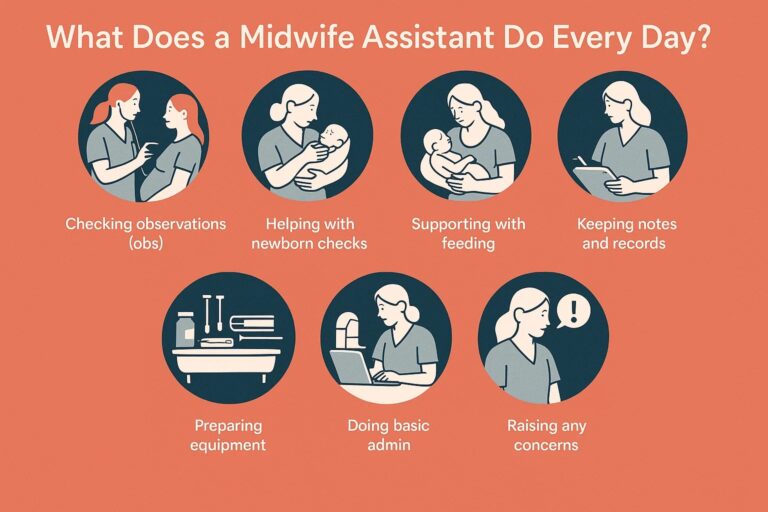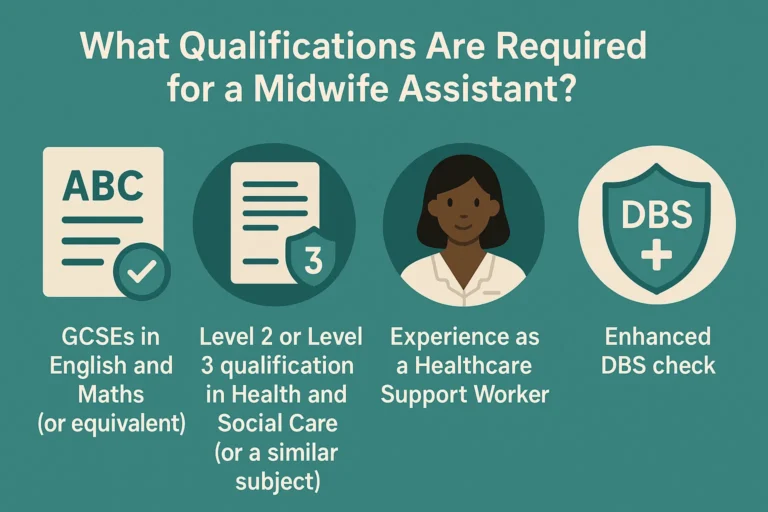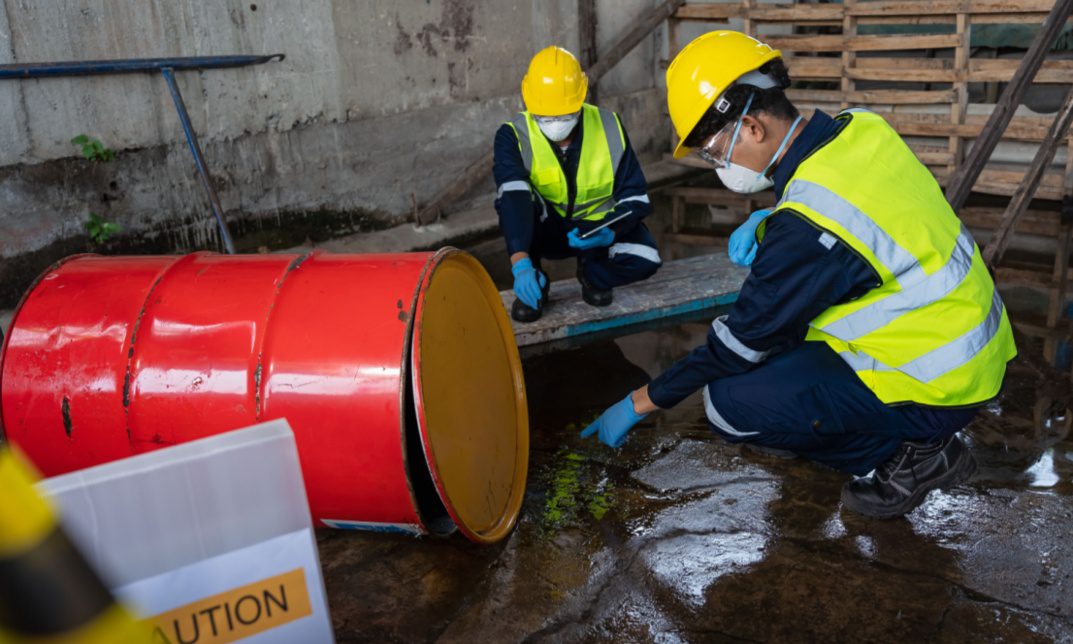No products in the basket.
When you hear the term midwife assistant in the NHS, the official name is actually Maternity Support Worker (MSW) — or sometimes Maternity Care Assistant. These are the wonderful people who work right alongside registered midwives, helping to care for women and families during pregnancy, labour, and after the baby is born.
Think of MSWs as the extra pair of caring hands and kind hearts that keep everything running smoothly. They might help take blood pressure, support during feeding, prepare equipment, comfort new mums, or make sure the ward is calm and organised. It’s a hands-on role where compassion and teamwork really shine.
Unlike midwives, MSWs don’t need to be registered with the Nursing and Midwifery Council (NMC) — but they still play a vital part in the maternity team. The good news is that this role is growing fast across the NHS. There are now clear training paths and progression routes, so if you start as an MSW, you can work your way up — even training to become a midwife one day if that’s your goal!
What Is a Midwife Assistant?
A midwife assistant — often called a Maternity Support Worker (MSW) or Maternity Care Assistant — helps midwives care for mums and babies before, during, and after birth.
In this job, you’ll do simple but important tasks like helping with feeding, taking vital signs, getting things ready for the midwife, and giving comfort to new mums. You’ll always work under the guidance of a midwife, so you’re never on your own.
It’s a warm, caring role where you get to support families at one of the happiest and most emotional times in their lives.
What Does a Midwife Assistant Do Every Day?

Every day, a midwife assistant — or Maternity Support Worker (MSW) — helps keep maternity care running smoothly. It’s a busy and rewarding role where no two days are the same!
Here’s what a typical day might include:
- Checking observations (obs): Taking mums’ blood pressure, temperature, and pulse to help midwives keep track of their health.
- Helping with newborn checks: Carrying out simple baby checks under set protocols and letting the midwife know if anything seems unusual.
- Supporting with feeding: Offering guidance and encouragement to mums learning to feed their babies, whether breast or bottle.
- Keeping notes and records: Writing down observations and updating care notes so everything is accurate and up to date.
- Preparing equipment: Making sure everything is clean, ready, and in the right place for the next birth or clinic.
- Chaperoning: Being present to support and reassure mums during examinations or procedures.
- Helping on the ward or in the birth suite: Tidying, restocking, and assisting midwives as needed.
- Doing basic admin: Answering phones, filing, or helping with appointments.
- Raising any concerns: If something doesn’t seem right, MSWs always report it straight away to a midwife — keeping mums and babies safe is the top priority.
Where Do Midwife Assistants Work?
Maternity Support Workers (MSWs) play a vital role in every part of maternity care. They work across a range of settings, supporting mothers, babies, and midwives before, during, and after birth.
Hospital Antenatal and Postnatal Wards
In these wards, MSWs help expectant mothers prepare for birth and support new mothers as they recover. They check observations, assist with feeding, and offer comfort and reassurance during those first important days.
Labour and Birth Suites
During labour, MSWs are close by to assist midwives with practical tasks and to provide calm, reassuring support to women in labour. They help set up equipment, keep the space ready, and ensure everything runs smoothly.
Outpatient Clinics
In outpatient settings, MSWs help with antenatal appointments and routine checks. They take observations, prepare rooms, record information, and make sure mums-to-be feel supported throughout their visits.
Community Maternity Teams
Many MSWs work out in the community, visiting families at home after birth. They offer advice on feeding and baby care, check on the wellbeing of mothers, and provide a friendly face during a very emotional time.
Private Hospitals and Birth Centres
Some MSWs choose to work in private settings, where they deliver the same high-quality, compassionate care in a smaller or more personalised environment.
What Skills Do You Need to Be a Midwife Assistant?
Being a Midwife Assistant (or Maternity Support Worker) is all about caring for people and working well with others. You don’t need to know everything right away — most skills are learned with training and experience — but there are some key qualities that really help.
Kindness and Compassion
You’ll be supporting women and families through big, emotional moments. Being warm, patient, and caring helps people feel safe and understood.
Good Communication
You’ll spend a lot of time talking and listening — to mums, midwives, and other staff. Clear, friendly communication makes a huge difference and keeps everyone on the same page.
Observation and Recording
Sometimes small details matter most. You’ll take readings like temperature or blood pressure, and you’ll write them down carefully so the midwife knows exactly what’s happening.
Teamwork
You’re never working alone — maternity care is all about teamwork. You’ll help midwives, doctors, and other staff to give mums and babies the best care possible.
Confidentiality
You’ll learn to keep personal information private. Families share sensitive details, and it’s important to protect that trust by following Data Protection rules.
Practical Skills and Safe Handling
You’ll often help move equipment, tidy beds, or assist mums safely. Learning proper manual handling keeps everyone safe from injury.
Emotional Strength
The job can be emotional — sometimes joyful, sometimes hard. Being steady, calm, and caring helps you support families through all kinds of situations.
Training and Learning
When you start, you’ll work toward the Care Certificate, which covers 15 key areas like communication, privacy, and safety. It’s a great introduction and helps you feel confident in your role.
To get started, you can complete the Care Certificate Course from Training Tale — an online, self-paced course that teaches all 15 essential care standards recognised across the NHS, helping you build the skills and confidence you need to shine as a Midwife Assistant.
What Qualifications Are Required?

Getting started as a Midwife Assistant (or Maternity Support Worker) is quite open and flexible — it’s more about your attitude and care for others than long lists of qualifications.
Here’s what most employers look for:
- GCSEs in English and Maths (or equivalent) – to show good communication and basic numeracy skills.
- Level 2 or Level 3 qualification in Health and Social Care (or a similar subject) – this is often preferred and helps you stand out.
- Experience as a Healthcare Support Worker – many NHS trusts promote staff from these roles into maternity support positions.
- Enhanced DBS check – required for anyone working with mothers, babies, and families to ensure safety.
Overall, employers want people who are kind, reliable, and eager to learn. The right attitude, plus some basic qualifications, can be the perfect start to a rewarding career in maternity care.
Read Training Tale’s detailed guide — How to Become a Midwife Assistant — to learn exactly what qualifications, skills, and steps you’ll need to begin a fulfilling career supporting mothers and babies.
How to Become a Midwife Assistant in the UK
Starting a career as a Midwife Assistant is a clear and achievable path — especially if you enjoy caring for others. Here’s how you can get started:
1. Apply for a Healthcare Support Worker or MSW Role
Look for Healthcare Support Worker (HCSW) or Maternity Support Worker (MSW) jobs in NHS maternity units. These are the best entry points into maternity care.
2. Complete the Care Certificate
Once you start, you’ll complete the Care Certificate during your induction. This covers 15 essential standards of care and helps you learn the basics of communication, safety, and patient support. You’ll also be trained in specific maternity skills while working under supervision.
3. Build Experience and Develop Your Skills
As you gain experience, you can use the NHS Maternity Support Worker Competency and Career Framework to guide your development. This framework helps you grow in confidence, take on more responsibility, and move up within maternity services.
4. Progress Through Apprenticeships (Optional)
Some people choose to progress through apprenticeships — for example:
- Start as a Healthcare Support Worker (Level 2)
- Move up to Senior Healthcare Support Worker (Level 3) with a maternity option
This route lets you earn while you learn, gaining both qualifications and hands-on experience.
How Long Does It Take to Train as a Midwife Assistant?
Training to become a Midwife Assistant doesn’t take years — you start learning from day one.
Most NHS trusts include a full induction period and the Care Certificate, which is usually completed within the first 3 to 6 months. This early training helps you understand the essentials of safe, caring practice — things like communication, infection control, and patient support — so you can work confidently and safely with mothers and babies.
After that, your learning continues on the job. You’ll complete more competencies and role-specific training as you gain experience. This ongoing approach means you can keep growing in confidence and skill while working, rather than having to train for a long time before starting your career.
How Much Does a Midwife Assistant Earn?
Most Midwife Assistants in the NHS are paid under the Agenda for Change pay system — usually at Band 2 or Band 3.
From 1 April 2025 (England), the pay rates are:
- Band 2: £24,465 a year
- Band 3: £24,937 to £26,598 a year (you move up within the band as you gain experience)
If you work in London, you’ll also get extra pay called High Cost Area Supplement (HCAS) — sometimes known as London weighting:
- Fringe area: +5%
- Outer London: +15%
- Inner London: +20%
What Are the Shifts and Hours Like?
Midwife Assistants (or Maternity Support Workers) usually work full-time hours — 37.5 hours a week in the NHS.
Because maternity services run 24 hours a day, 7 days a week, you can expect to work a mix of day and night shifts, as well as some weekends and bank holidays.
Many maternity units use 12-hour shifts or rotating shift patterns, which means your work schedule may change from week to week. This can take some getting used to, but it also means you’ll often have several days off in between shifts — giving you time to rest and recharge.
It’s a busy and hands-on role, but the variety keeps the job interesting and rewarding.
Is There Career Progression After Becoming a Midwife Assistant?
Absolutely — there are plenty of ways to grow once you’ve started as a Midwife Assistant. Many people move into senior roles, such as Senior MSW at Band 3 or 4, where you take on more responsibility and may supervise others.
Some MSWs choose to specialise, for example in infant feeding support, maternity triage, or community care. Others continue their learning through apprenticeships or further study — progressing to become a Nursing Associate (Level 5) or even completing a Midwifery Degree Apprenticeship (Level 6) to become a registered midwife, if they meet the entry requirements.
The University of Greenwich and many other universities across the UK offer these development routes, helping dedicated MSWs turn their hands-on experience into a professional qualification.
What Makes Being a Midwife Assistant Rewarding?
Being a Midwife Assistant is a truly special job. You get to be part of one of the most meaningful times in people’s lives — supporting families as they welcome their new baby into the world. Every day, you make a real difference by helping mothers feel safe, cared for, and comfortable.
You’ll be there during moments of joy, and sometimes challenge, helping to keep mothers and babies safe, warm, and supported. You’ll also see the incredible bond between parents and their newborns begin to grow — and know you played a part in that.
It’s not always easy work; it can be physically and emotionally demanding. But the sense of teamwork, purpose, and shared care makes it deeply rewarding. You’ll work alongside experienced midwives and healthcare professionals who value your contribution and support your growth.
Final Thoughts: Is a Midwife Assistant Role Right for You?
If you love caring for others and want a career where every day matters, becoming a Midwife Assistant could be the perfect choice.
To get started:
- Read the NHS Maternity Support Worker Framework to understand the role and its career paths.
- Update your CV to highlight caring, communication, and teamwork skills.
- Complete a short care or safeguarding course to show your commitment to learning.
- Set job alerts on NHS Jobs for “Maternity Support Worker” or “Maternity Care Assistant” roles near you.
And if you dream of going further — perhaps one day becoming a registered midwife — check out the Level 7 Midwifery Course from Training Tale. It’s designed to build advanced knowledge and confidence for those ready to take the next step in their maternity career.
Start small, learn every day, and you could grow into a lifelong career helping families at the most important time of their lives.
FAQs
1. What do midwife assistants do?
- They support midwives in caring for mothers and babies before, during, and after birth — helping with checks, feeding, comfort, record-keeping, and keeping maternity areas organised and safe.
2. What qualifications do you need to be a midwife assistant?
- Most employers ask for GCSE English and Maths, plus a Level 2 or 3 Health & Social Care qualification. You’ll also need an enhanced DBS check to work with mothers and babies.
3. What is a midwife assistant called?
- In the NHS, the official title is Maternity Support Worker (MSW) or sometimes Maternity Care Assistant (MCA). Both work under the supervision of a registered midwife.
4. What band is a midwife assistant?
- Most NHS midwife assistants are paid under Agenda for Change Band 2 or 3, depending on experience, training, and specific duties within the maternity team.
5. What is the lowest band in midwifery?
- Band 2 is the lowest for support staff roles such as MSWs. Registered midwives usually start at Band 5, progressing as they gain skills and experience.
6. How long does it take to train as a maternity care assistant?
- The induction and Care Certificate normally take 3–6 months, depending on the trust. You continue building skills and competencies while working in the role.
7. How to become a maternity care assistant in the NHS?
- Apply for Healthcare Support Worker or Maternity Support Worker roles on NHS Jobs, complete the Care Certificate, and gain experience using the NHS MSW Career Framework for progression.
8. Is midwifery harder than nursing?
- Both are demanding but rewarding. Midwifery focuses on pregnancy and birth, requiring emotional strength, calm under pressure, and close support for mothers and babies.
9. Can I be a midwife without a degree?
- To register as a midwife, you need a Midwifery Degree. However, you can start as an MSW and progress through apprenticeships or further study toward qualification.




